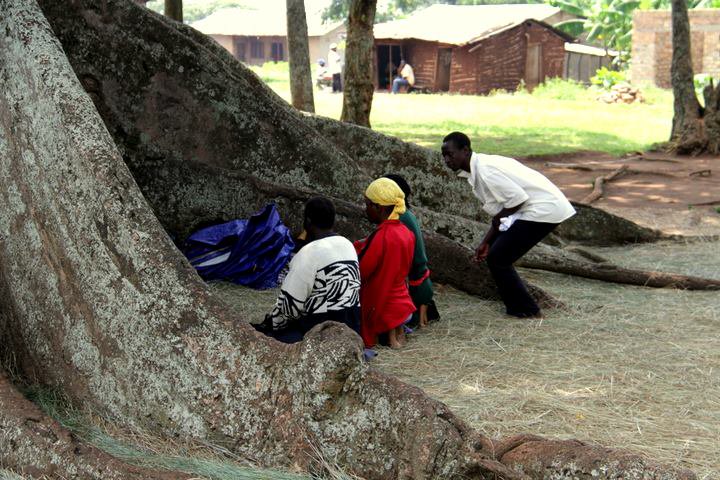The_Nakayima_tree_01.jpg (720 × 480 pixels, file size: 97 KB, MIME type: image/jpeg)
| This is a file from the Wikimedia Commons. Information from its description page there is shown below. Commons is a freely licensed media file repository. You can help. |
Summary
| DescriptionThe Nakayima tree 01.jpg |
English: Nakayima tree is positioned on Mubende hill approximately 3 ½ hours’ drive from Kampala – the Uganda’s capital, Nakayima tree is a rich heritage site that should not be missed by travellers in Uganda.
Oral tradition has it that the sacred status of Mubende Hill dates to pre-Bachwezi times when it was settled by the magician called Kamwenge, who hailed from the vicinity of the present day Mbarara. The magician’s two sons established themselves as important local rulers, and their capital on Mubende Hill was known at that time which rapidly became on the of the largest settlements in the region. The site was however taken by the Bachwezi ruler Ndahura who resided therefore several years before the renouncing in favour of his son Wamala to retire to his birthplace near Fort portal Town. The specifics of these oral traditions however are subjected to some debate, but their broad sweep is corroborated by archaeological excavations that suggest an important settlement which existed on the crest of Mubende Hill at around the time when Ndahura would have lived. The most prominent feature on Mubende Hill today is the Nakayima tree, which according to oral traditional harbours the spirit of Ndahura, defied both the Banyaro and Buganda as the god of small pox. The tree is named after a hereditary line of sorceries, which according to some sources claimed direct descent from Ndahura’s wife Nakayima, but might also have been founded by a priest from Ankole who adopted her name. The Nakyima traditionally was not only a care taker of the tree, but she was also regularly possessed by the spirit of Ndahura, on which occasions her extremities became covered in smallpox marks for several days. Her supernatural powers are said to have included the ability to cure and prevent small pox and other fatal diseases, and to help infertile women bear children. The Nakayima was receiving regular tributes from the kings of both of these polities, and also overseeing ritual ceremonies that involved the sacrifice of cows, sheep and more occasionally teenage boys and girls. If the oral tradition is to be believed, the Nakayima lineage was for full four centuries an acknowledged spiritual figured to both the rulers and the peasantry of Buganda and Bunyoro. Its end was remarkably abrupt. The first intimation of its demise in 1888, when the religious conflict that rocked Buganda forced the incumbent nakayima, Nyanjara, to flee from Mubende. When she returned a year later, all but one of the seven huts traditionally in habited by the Nakayima razed, while the graves of her predecessors had been defaced, and her sacred drums had vanished. This attack had no immediate impact on the Nakayima’s influence in Bunyoro, then relatively un exposed to exotic religions-indeed, king Kabalega made a special visit to Mubende to pay Nyanjara tribute in 1899. As early as 1902, the political autonomy that had characterized the once- feared and revered spiritual community led by the Nakayima was curtailed when Mubende Hill was placed under the indirect colonial rule of a Muaganda Saza chief appointed by the British administration at Kakumiro. Nyanjara retired to Bugogo, where she died in 1907, the first Nakayima not to be interred in the traditional cemetery near the sacred tree, through eventually she was buried in isolation at the base of Mubende Hill. Her fantastic regalia, confiscated by the authorities now forms one of the most impressive displays in the national museum in Kampala-together with two large and ancient pots.
|
||
| Date | |||
| Source | Own work | ||
| Author | Eustusm10 |
| Camera location | 0° 34′ 31″ N, 31° 22′ 45″ E | View this and other nearby images on: OpenStreetMap |
|---|
THE CULTURAL SECRET BEHIND UGANDA’S NAKAYIMA TREE
Licensing
- You are free:
- to share – to copy, distribute and transmit the work
- to remix – to adapt the work
- Under the following conditions:
- attribution – You must give appropriate credit, provide a link to the license, and indicate if changes were made. You may do so in any reasonable manner, but not in any way that suggests the licensor endorses you or your use.
- share alike – If you remix, transform, or build upon the material, you must distribute your contributions under the same or compatible license as the original.

|
This image was uploaded as part of Wiki Loves Africa 2017 photographic contest.
Afrikaans | Alemannisch | العربية | বাংলা | brezhoneg | català | Cymraeg | dansk | Deutsch | English | español | eesti | suomi | français | Frysk | Gaeilge | galego | magyar | Ido | Indonesia | italiano | 日本語 | 한국어 | Lëtzebuergesch | македонски | norsk bokmål | नेपाली | Nederlands | norsk nynorsk | norsk | português | română | русский | sicilianu | slovenščina | shqip | српски / srpski | svenska | ไทย | Tagalog | українська | +/− |
 |
Captions
Items portrayed in this file
depicts
4 October 2017
0°34'31.001"N, 31°22'45.001"E
image/jpeg
File history
Click on a date/time to view the file as it appeared at that time.
| Date/Time | Thumbnail | Dimensions | User | Comment | |
|---|---|---|---|---|---|
| current | 14:49, 4 October 2017 |  | 720 × 480 (97 KB) | Eustusm10 | User created page with UploadWizard |
File usage
The following 2 pages use this file:
Global file usage
The following other wikis use this file:
- Usage on lg.wikipedia.org
- Usage on rw.wikipedia.org









